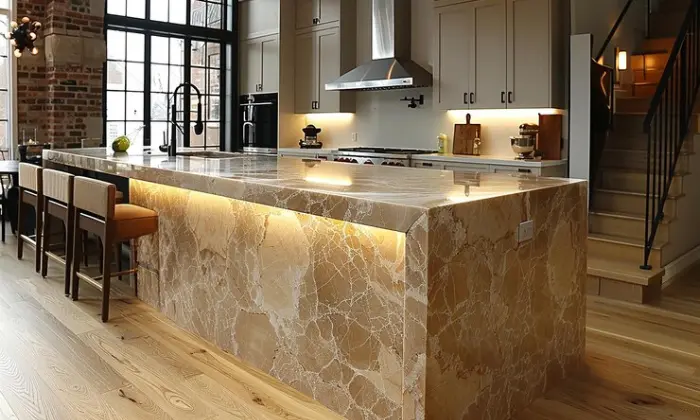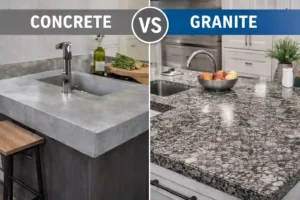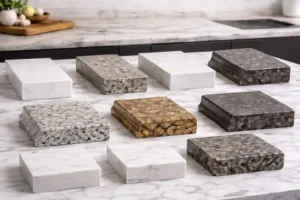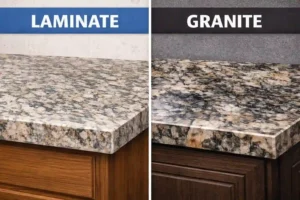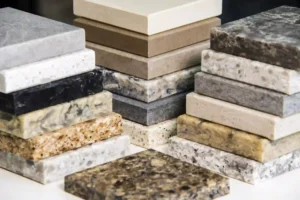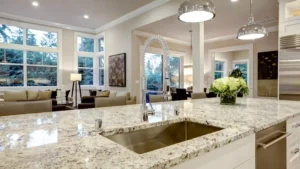When it comes to choosing the perfect countertop material for your home, the options can seem endless. Granite, quartz, and marble often dominate the conversation, but have you considered travertine countertops? This natural stone has been used for centuries in architecture and design, offering a rich blend of historical significance and timeless elegance. More than just a durable surface, travertine brings a unique beauty to both kitchens and bathrooms, making it an excellent alternative to more common materials. Whether you’re seeking a rustic, old-world charm or a sleek, modern look, travertine kitchen countertops provide the versatility and aesthetic appeal you need to elevate your home’s design.
Is Travertine Good for Countertops?
Absolutely! Travertine for countertops offers a stunning, durable surface for both residential and commercial spaces. Just like granite and marble, travertine is a natural stone, known for its smooth texture and timeless beauty. Whether you’re renovating your kitchen or upgrading your bathroom, travertine provides a sophisticated and long-lasting solution.
One of the standout features of travertine is its availability in both travertine tile and travertine slab formate, offering flexibility to match your design preferences. With a variety of hues ranging from warm earth tones to cool neutrals, it’s easy to find the perfect match for your space.
Travertine Countertops Pros and Cons
Travertine countertops are gaining popularity for their luxurious and natural beauty, often compared to high-end stones like marble and granite. This natural stone offers a distinct chic look that appeals to homeowners seeking elegance without breaking the bank. Travertine’s versatility allows it to shine in both indoor and outdoor applications, such as backsplashes, showers, and sinks.
Just like any other countertop material, travertine comes with its benefits and drawbacks. One of the most significant advantages is its affordable price point. While granite and marble start at around $15 per square foot, travertine countertops can be found for as low as $11 per square foot, offering luxury at a more accessible price.
Pros of Travertine Countertop
- Travertine boasts a unique appearance with warm tones and intricate veining that gives any space a sophisticated and timeless look.
- Compared to other natural stones like granite or quartz, travertine provides a more cost-effective option without compromising on style.
- Its natural shine reflects light, brightening up your kitchen or bathroom, and adding a sense of space and openness.
- Travertine is resilient against stains and harsh weather conditions, making it a strong contender for outdoor projects as well.
- Available in both tiles and slabs, travertine is easy to cut and ideal for custom designs, including countertops with unusual shapes or intricate detailing.
Cons of Travertine Countertop
- One major drawback is its vulnerability to acidic substances like lemon juice, vinegar, or tea, which can stain the stone. Regular sealing is crucial to prevent damage.
- As a softer stone, travertine is prone to scratches, etching, and general wear, especially in high-traffic areas. Proper care and the use of alkaline-based cleaners can help maintain its integrity.
- Unlike tougher stones like granite, travertine is more susceptible to heat damage, meaning hot pads or cooling racks are essential to protect the surface from high temperatures.
- Kitchens with heavy daily use might not be the best place for travertine countertops, as they could deteriorate faster in such environments.
Is Travertine Countertops Useful in the Kitchen?
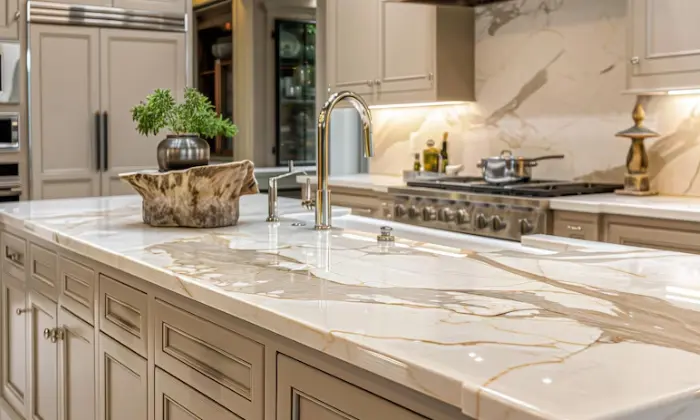
Travertine kitchen countertops are highly heat-resistant, making them ideal for handling hot pots and pans without damage. This natural stone offers a unique, earthy look that enhances any kitchen’s aesthetic. Its natural beauty makes it a standout choice for those seeking a blend of elegance and functionality.
However, travertine countertops in the kitchen require consistent maintenance. Being porous, they are prone to stains and scratches if not properly sealed and cared for. Regular sealing and careful cleaning are necessary to preserve their appearance and durability, ensuring they remain a lasting feature in your kitchen.
Should You Choose Travertine as a Kitchen Countertop?
When considering travertine countertops, it’s essential to evaluate your kitchen or bathroom’s specific needs. This natural stone boasts durability, heat resistance, and a unique appearance, but it requires regular maintenance to keep it in top condition.
Before committing to travertine, research its various colors, patterns, and finishes to see which suits your style. Additionally, consult with natural stone experts to ensure you understand the care requirements and long-term durability. With the right knowledge, you can decide if travertine is the ideal choice for your home.
Expert Travertine Countertop Installations You Can Trust
Upgrade your home effortlessly with our professional travertine countertop installations. At SF Marble & Granite, we ensure every surface is crafted with precision and care to bring natural elegance into your kitchen. Ready for a transformation? Discover our specialized services at Countertops Installation In Lowell and let our experts turn your vision into reality.
FAQs
What is the disadvantage of travertine?
One of the main drawbacks of travertine is its porosity. This characteristic makes it susceptible to staining and requires regular sealing to maintain its appearance and durability. Additionally, travertine can be prone to scratching and may need frequent maintenance compared to less porous materials.
Is travertine good for a kitchen?
Travertine can be a stylish choice for kitchens, offering unique beauty and heat resistance. However, due to its porous nature, it requires regular sealing to prevent stains and damage. While it can handle everyday kitchen use, the extra maintenance may not be ideal for all homeowners.
Is travertine more expensive than granite?
Travertine is less expensive than granite. However, the overall cost can vary based on factors such as quality, finish, and installation. Granite’s durability and lower maintenance needs can sometimes justify its higher price, making it a cost-effective choice in the long run for some.

